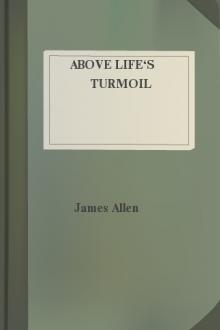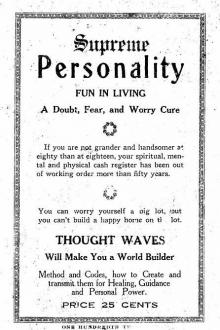Above Life's Turmoil - James Allen (summer reads txt) 📗

- Author: James Allen
- Performer: 1600960979
Book online «Above Life's Turmoil - James Allen (summer reads txt) 📗». Author James Allen
The Man of Integrity
There are times in the life of every man who takes his stand on high moral principles when his faith in, and knowledge of, those principles is tested to the uttermost, and the way in which he comes out of the fiery trial decides as to whether he has sufficient strength to live as a man of Truth, and join the company of the free, or shall still remain a slave and a hireling to the cruel taskmaster, Self.
Such times of trial generally assume the form of a temptation to do a wrong thing and continue in comfort and prosperity, or to stand by what is right and accept poverty and failure; and so powerful is the trial that, to the tempted one, it plainly appears on the face of things as though, if he chooses the wrong, his material success will be assured for the remainder of his life, but if he does what is right, he will be ruined for ever.
Frequently the man at once quails and gives way before this appalling prospect which the Path of Righteousness seems to hold out for him, but should he prove sufficiently strong to withstand this onslaught of temptation, then the inward seducer the spirit of self, assumes the grab of an Angel of Light, and whispers, “Think of your wife and children; think of those who are dependent upon you; will you bring them down to disgrace and starvation?”
Strong indeed and pure must be the man who can come triumphant out of such a trial, but he who does so, enters at once a higher realm of life, where his spiritual eyes are opened to see beautiful things; and then poverty and ruin which seemed inevitable do not come, but a more abiding success comes, and a peaceful heart and a quiet conscience. But he who fails does not obtain the promised prosperity, and his heart is restless and his conscience troubled.
The right-doer cannot ultimately fail, the wrong-doer cannot ultimately succeed, for
_”Such is the Law which moves to Righteousness
Which none at last can turn aside or stay,“_
and it is because justice is at the heart of things-because the Great Law is good-that the man of integrity is superior to fear, and failure, and poverty, and shame, and disgrace.As the poet further says of this Law:
_”The heart of its Love, the end of it
Is peace and cosummation sweet-obey.“_
The man who fearing the loss of present pleasures or material comforts, denies the Truth within him, can be injured, and robbed, and degraded, and trampled upon, because he has first injured, robbed and degraded, and trampled upon his own nobler self; but the man of steadfast virtue, of unblemished integrity, cannot be subject to such conditions, because he has denied the craven self within him and has taken refuge in Truth. It is not the scourge and the chains which make a man a slave, but the fact that he is a slave.
Slander, Accusation, and malice cannot affect the righteous man, nor call from him any bitter response, nor does he need to go about to defend himself and prove his innocence. His innocence and integrity alone are a sufficient answer to all that hatred may attempt against him. Nor can he ever be subdued by the forces of darkness, having subdued all those forces within himself; but he turns all evil things to good account - out of darkness he brings light, out of hatred love, out of dishonour honour; and slanders, envies, and misrepresentations only serve to make more bright the jewel of Truth within him, and to glorify his high and holy destiny.
Let the man of integrity rejoice and be glad when he is severely tried; let him be thankful that he has been given an opportunity of proving his loyalty to the noble principles which he has espoused; and let him think: “Now is the hour of holy opportunity! Now is the day of triumph for Truth! Though I lose the whole world I will note desert the right!” So thinking, he will return good for evil, and will think compassionately of the wrong-doer.
The slanderer, the backbiter, and the wrong-doer may seem to succeed for a time, but the Law of Justice prevails; the man of integrity may seem to fail for a time, but he is invincible, and in none of the worlds, visible or invisible, can there be forged a weapon that shall prevail against him.
Discrimination
There is one quality which is pre-eminently necessary to spiritual development, the quality of discrimination.
A man’s spiritual progress will be painfully slow and uncertain until there opens with him the eye of discrimination, for without this testing, proving, searching quality, he will but grope in the dark, will be unable to distinguish the real from the unreal, the shadow from the substance, and will so confuse the false with the true as to mistake the inward promptings of his animal nature for those of the spirit of Truth.
A blind man left in a strange place may go grope his way in darkness, but not without much confusion and many painful falls and bruisings. Without discrimination a man is mentally blind, and his life is a painful groping in darkness, a confusion in which vice and virtue are indistinguishable one from the other, where facts are confounded with truths; opinions with principles, and where ideas, events, men, and things appear to be out of all relation to each other.
A man’s mind and life should be free from confusion. He should be prepared to meet every mental, material and spritual difficulty, and should not be inextricably caught (as many are) in the meshes of doubt, indecision and uncertainity when troubles and so-called misfortunes come along. He should be fortified against every emergency that can come against him; but such mental preparedness and strength cannot be attained in any degree without discrimination, and discrimination can only be developed by bringing into play and constantly exercising the analytical faculty.
Mind, like muscle, is developed by use, and the assiduous exercise of the mind in any given direction will develop, in that direction, mental capacity and power. The merely critical faculty is developed and strengthened by continuously comparing and analysing the ideas and opinions of others. But discrimination is something more and greater than criticism; it is a spiritual quality from which the cruelty and egotism which so frequently accompany criticism are eliminated, and by virtue of which a man sees things as they are, and not as he would like them to be.
Discrimination, being a spiritual quality, can only be developed by spiritual methods, namely, by questioning, examining, and analysing one’s own ideas, opinions, and conduct. The critical, fault finding faculty must be withdrawn from its merciless application to the opinions and conduct of others, and must be applied, with undiminished severity, to oneself. A man must be prepared to question his every opinion, his every thought, and his every line of conduct, and rigorously and logically test them; only in this way can the discrimination which destroys confusion will be developed.
Before a man can enter upon such mental exercise, he must make himself of a teachable spirit. This does not mean that he must allow himself to be led by others; it means that he must be prepared to yield up any cherished thoughts to which he clings, if it will not bear the penetrating light of reason, if it shrivels up before the pure flames of searching aspirations. The man who says, “I am right!” and who refuses to question his position in order to discover whether he is right, will continue to follow the line of his passions and prejudices, and will not acquire discrimination. The man who humbly asks, “Am I right?” and then proceeds to test and prove his position by earnest thought and the love of Truth, will always be able to discover the true and to distinguish it from the false, and he will acquire the priceless possession of discrimination.
The man who is afraid to think searchingly upon his opinions, and to reason critically upon his position, will have to develop moral courage before he can acquire discrimination.
A man must be true to himself, fearless with himself, before he can perceive the Pure Principles of Truth, before he can receive the all-revealing Light of Truth.
The more Truth is inquired of, the brighter it shines; it cannot suffer under examination and analysis.
The more error is questioned, the darker it grows; it cannot survive the entrance of pure and searching thought.
To “prove all things” is to find the good and throw the evil.
He who reasons and meditates learns to discriminate; he who discriminates discovers the eternally True.
Confusion, suffering and spiritual darkness follow the thoughtless.
Harmony, blessedness and the Light of Truth attend upon the thoughtful.
Passion and prejudice are blind, and cannot discriminate: they are still crucifying the Christ and releasing Barabbas.
Belief, The Basis of Action
Belief is an important word in the teachings of the wise, and it figures prominently in all religions. According to Jesus, a certain kind of belief is necessary to salvation or regeneration, and Buddha definitely taught that right belief is the first and most essential step in the Way of Truth, as without right belief there cannot be right conduct, and he who has not learned how to rightly govern and conduct himself, has not yet comprehended the simplest rudiments of Truth.
Belief as laid down by the Great Teachers, is not belief in any particualr school, philosophy, or religion, but consists of an altitude of mind determining the whole course of one’s life. Belief and conduct are, therefore inseparable, for the one determines the other.
Belief is the basis of all action, and, this being so, the belief which dominates the hearts or mind is shown in the life. Every man acts, thinks, lives in exact accordance with the belief which is rooted in his innermost being, and such is the mathematical nature of the laws which govern mind that it is absolutely impossible for anyone to believe in two opposing conditions at the same time. For instance, it is impossible to believe in justice and injustice, hatred and love, peace and strife, self and truth. Every man believes in one or the other of these opposites, never in both, and the daily conduct of every man indicates the nature of his belief. The man who believes in justice, who regards it as an eternal and indestructible Principle, never boils over with righteous indignation, does not grow cynical and pessimistic over the inequalities of life, and remains calm and untroubled through all trials and difficulties. It is impossible for him to act otherwise, for he believes that justice reigns, and that, therefore, all that is called injustice is fleeting and illusory.
The man who is continually getting enraged over the injustice of his fellow men, who talks about himself being badly treated, or who mourns over the lack of justice in the world around him, shows by his conduct, his attitude of mind, that he believes in injustice. However he may protest to the contrary, in his inmost heart he believes that confusion and chaos are dominant in the universe, the result





Comments (0)